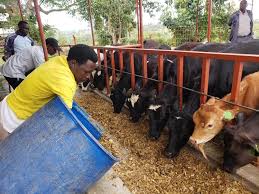Trymore Tagwirei
As Zimbabwe continues to grapple with the effects of climate change and recurring droughts, the Ministry of Lands, Agriculture, Fisheries, Water and Rural Development is urging livestock farmers to adopt urea-treated stover as a sustainable and cost-effective livestock feed alternative.
Urea treatment enhances the nutritional value of dry crop residues—such as maize stalks—by applying a urea-water solution. This process transforms otherwise low-value stover into a viable feed source, particularly useful during the dry season when natural pastures are depleted.
Speaking at a livestock fodder improvement field day held at Heathcoat Farm in Ward 6, Masvingo West, Leonard Munamati, Acting Chief Director of the Department of Agricultural and Rural Development Advisory Services (ARDAS), emphasized the critical role of this practice.
“We are encouraging all farmers to treat their crop residues using urea. This is a proven strategy to reduce feed shortages and boost the health and productivity of cattle, goats, and sheep, especially when pasture is scarce,” said Munamati.
During the event, farmers were trained on practical aspects of preparing urea-treated stover. The process involves stacking 100kg layers of stover in pits lined with black plastic sheeting. Each layer is sprayed with 20 litres of a urea-water solution, compacted to remove air, sealed, and covered with soil. Fermentation takes between 21 and 35 days before the feed is ready for use.
Demonstrations and hands-on sessions showed how proper ratios, airtight storage, and timing are crucial to producing high-quality treated fodder.
Munamati said the government, through ARDAS, is scaling up training initiatives nationwide to ensure more farmers can implement this method.
“This initiative forms part of a broader strategy to promote climate-smart agriculture and build resilience within the livestock sector,” he added.
The field day attracted a diverse group of stakeholders, including farmers, AGRITEX officers, extension workers, and community leaders. Attendees discussed fodder planning, livestock nutrition, and other adaptive strategies ahead of the next lean season.
With the majority of Zimbabwe’s agriculture still rain-fed, livestock farmers face increasing challenges from prolonged dry spells. Urea-treated stover offers a practical, nutritious, and locally available feed option—helping farmers reduce dependence on dwindling grazing lands while safeguarding their herds.








